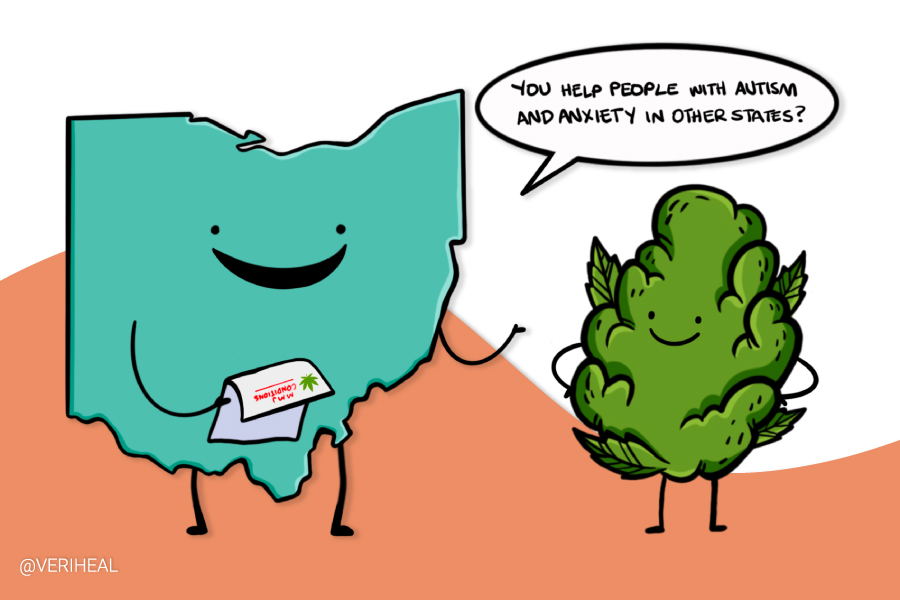Ohio is currently accepting petitions in an attempt to expand the list of qualifying conditions for medical cannabis. But this has failed in the past and could prevent measures from moving forward this time unless new research could be presented to sway the state medical board’s decision. The 34th largest state by area and the seventh most populated state in our country is Ohio, aka the Buckeye state. Ohio became the 25th state to legalize medical cannabis back on June 8 of 2016. Medical cannabis is now available to residents in Ohio who meet one of 22 qualifying conditions laid out by House Bill 523.
Of the current 22 qualifying conditions to receive a legal recommendation for medical cannabis, opioid use disorder, Autism Spectrum Disorder, and anxiety are not on that list. Advocates have tried to make this happen in the past partitioning for the addition of these three conditions, but they were ultimately denied by the state’s medical review board.
Strict Guidelines Must be Met Before Conditions Will Be Considered
In regard to the petition to add these three conditions to state law, advocates must be very careful. According to the Ohio State Medical Marijuana website, the petition will not be considered if received after December 31, 2020, if it seeks to add a broad category of diseases or conditions, or if the condition is one that has been previously reviewed by the board and rejected unless new scientific research that supports the request is offered.
Since these conditions have been denied in the past, advocates must meet very specific guidelines to try to get them approved this time. The state website says,
“If you are petitioning for a previously considered condition, do not resubmit documents which have already been reviewed by the board, and only new scientific research should be submitted for previously rejected petitions.”
One Ohio Physician Embraces Cannabis Research But Denies Effectiveness
Back in 2019, it seemed as though advocates might have had things going in their favor to add Autism Spectrum Disorder and anxiety to this list of qualifying conditions. However, that forward momentum was short-lived. Several physicians gave their input and were the deciding factors in helping prevent the addition of these two conditions to the qualifying list. One, in particular, Dr. Anup Patel is the most perplexing.
Dr. Patel is a member of the Nationwide Children’s Hospital. He ran clinical trials for big pharma’s GW Pharmaceuticals research division on Epidiolex. Epidiolex is an FDA approved cannabis-based pharmaceutical manufactured drug used in the treatment of seizures. Yet Dr. Patel held the view that there is little to no gold standard research to prove cannabis effectively helps treat anxiety or Autism. It seems incredibly conflicting that a medical professional can lead research on cannabis medicine that finds FDA approval yet turn around and say that cannabis has no proof of being effective?
Why You Should Get Your Medical Marijuana Card
Veriheal has satisfied millions of patients nationwide by giving them access to these benefits
- Larger purchase limits
- Peace of mind
- Enhanced legal protection
- Access to higher potency strains
- Save up to 25% on cannabis purchases
- Skip the line at the dispensary
In the opinion of this writer, physicians like Dr. Patel are bought and paid for. It is maddening to see medical professionals clinging to the destructive addictive past of pharmaceuticals without open acceptance to plant medicine. It’s frustrating scenarios such as this that have contributed to the failed War on Drugs and have cost the United States countless billions of wasted tax dollars in the process.
Research Shows to be Supportive Despite it All
In fact, cannabis has shown potential in managing Autism. In October of 2019, just two months after Dr. Patel made his opinionated viewpoint about the lack of proof of effectiveness in cannabis to treat Autism, the US National Library of Medicine National Institutes of Health had a research paper published that suggested Dr. Patel was wrong.
The study is titled, “Effects of CBD-Enriched Cannabis sativa Extract on Autism Spectrum Disorder Symptoms: An Observational Study of 18 Participants Undergoing Compassionate Use” and is published on the NCBI. It revealed that,
“Overall, mostly positive outcomes were reported for the 15 patients that adhered to the standardized CE treatment (one case for six months and 14 cases for nine months), especially regarding improvements in sleep disorders, seizures, and behavioral crisis. Also, signs of improvement were reported for motor development, communication and social interaction, and cognitive performance.”
Maybe there were just enough lacking studies at the time for Dr. Patel to support denying the addition of Autism, anxiety, and opioid dependency to the list of qualifying conditions in Ohio. But here in 2020, that is not the case. Should the medical board in Ohio deny adding these conditions to the state’s list, it may be time to change who sits on this board. Last year Dr. Patel said, “the State Medical Board of Ohio is relying on traditional medicine.” Let’s see if this draconian stance is still supported this year and, if so, by who.
Author, Share & Comments







